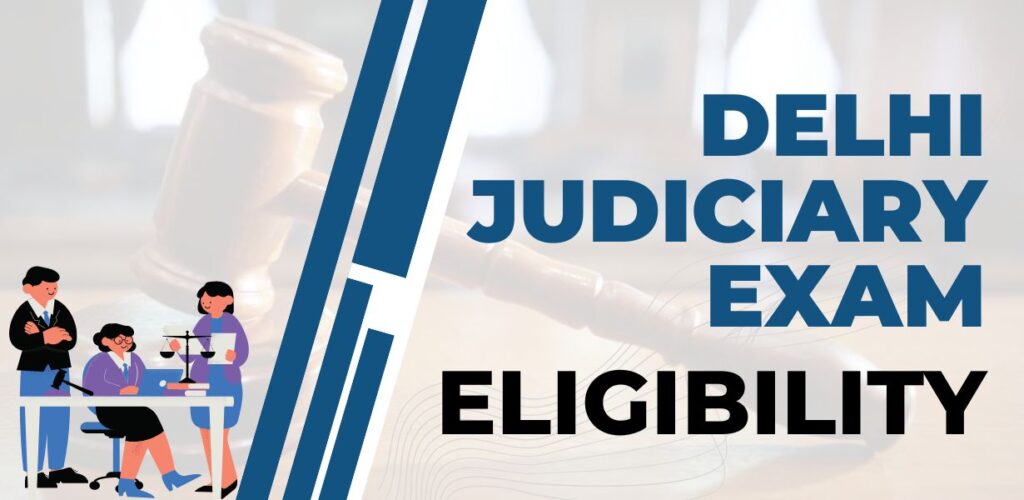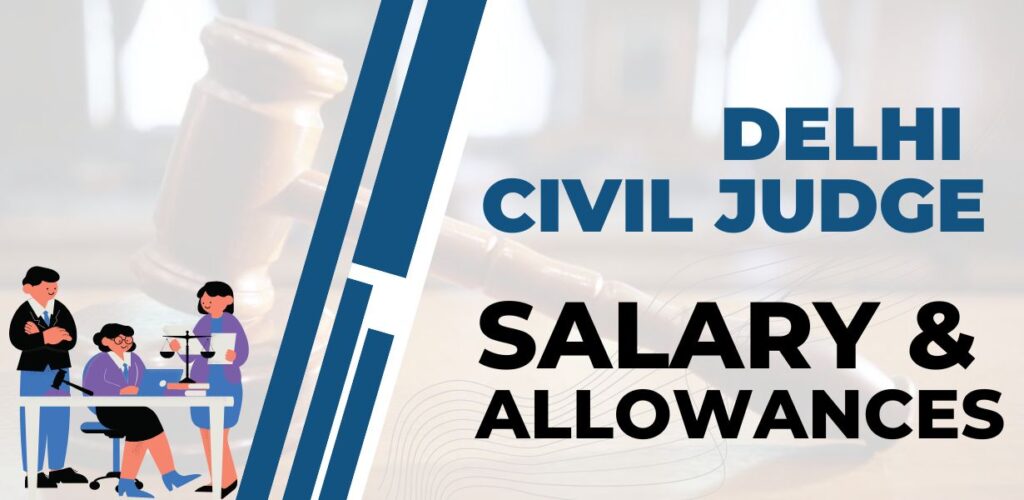Delhi Judiciary Exam 2024: Everything You Need to Know

If you are planning to pursue a career in the legal field, then the Delhi Judiciary Exam is something you need to know about. This exam is conducted by the High Court of Delhi every year to recruit Civil Judges. The exam is highly competitive and demands a thorough understanding of the Indian legal system.
The Delhi Judiciary Exam is a three-stage examination process that includes a preliminary exam, mains exam and interview. The preliminary exam is a screening test that comprises objective-type questions.
On the other hand, the mains exam is a written test that evaluates the candidate’s knowledge of the law and their ability to apply it to real-life situations. If you pass both stages of the exam, you will be eligible for an interview round.
Page Contents
- 1 Delhi Judiciary Exam Eligibility Criteria
- 2 Delhi Civil Judge Salary and Allowances
- 3 Exam Process
- 4 Delhi Civil Judge Exam Pattern
- 5 Minimum Qualifying Marks
- 6 Preliminary Exam Syllabus
- 7 Mains Exam Syllabus
- 8 Interview Process
- 9 Admit Card
- 10 Examination Centres
- 11 Result
- 12 Delhi Judicial Services Exam Cut Off
- 13 What Next?
Delhi Judiciary Exam Eligibility Criteria

If you’re planning to take the Delhi Judiciary Exam, you need to meet certain eligibility criteria. Here are the requirements you need to fulfill:
Citizenship
To be eligible for the Delhi Judiciary Exam, you need to be a citizen of India. If you’re not an Indian citizen, you won’t be able to take the exam.
Educational Qualification
You must have a law degree from a recognized university to be eligible for the Delhi Judiciary Exam. If you don’t have a law degree, you won’t be able to take the exam.
Age Limit
The age limit for the Delhi Judiciary Exam is 32 years. You must be under the age of 32 on the 1st day of January of the year in which the applications for appointment are invited. There is no minimum age limit for the exam.
Reserved Category
Candidates belonging to Scheduled Castes/Tribes are eligible for a relaxation of 5 years in the upper age limit.
Additionally, Ex-Servicemen, including Emergency Commissioned Officers and Short Service Commissioned Officers, who have served at least 5 years in the military and have been released upon completion of their assignment (including those whose assignment is due to be completed within 6 months), are also eligible for a relaxation of the upper age limit by a maximum of 5 years.
This relaxation is not applicable to those dismissed or discharged due to misconduct or inefficiency or physical disability attributable to military service or invalidment.
It’s important to note that if you belong to a reserved category, you need to provide documentary proof of your category at the time of the exam. If you fail to provide the necessary proof, you won’t be eligible for the relaxation in age limit.
Application Process
Application Form
To apply for the Delhi Judiciary Exam 2024, you need to fill out the application form. The application form is available in an online format. You can access the form on the official website of the Delhi High Court. While filling out the form, make sure you provide correct information.
How to fill the Delhi Judicial Services form?
To fill out the Delhi Judiciary Exam application form, follow these steps:
- Visit the official website of the Delhi High Court.
- Register yourself by entering all the required details like Name, DOB, Email-ID, Password.
- Login using your Login ID and Password sent to the candidate via email by clicking on the Already Logged In Candidate tab to complete the process.
- Enter the verification code as shown, then press the Submit button.
- Fill out the online application form with your information.
How to edit the Delhi Judiciary exam form?
If you need to edit any information on the application form, you can do so before submitting the form. Once you submit the form, you will not be able to edit it. To edit the form, follow these steps:
- Login to the official website of the Delhi High Court.
- Click on the ‘Edit Application Form’ link.
- Make the necessary changes and submit the form again.
Important Dates DJS Exam
It is important to keep track of the important dates related to the Delhi Judiciary Exam. The following table provides the important dates for the Delhi Judiciary Exam:
| Event | Date |
| Application Form Availability | To be announced |
| Last Date to Submit Application Form | To be announced |
| Admit Card Release Date | To be announced |
| Exam Date | To be announced |
Delhi Judiciary Exam Fees
To complete the application process, you need to pay the application fee. Make sure to pay the fee before the last date of submission.
Candidates applying under the General Category are required to pay a non-refundable fee of Rs.1000/-, while reserved category candidates (Scheduled Caste / Scheduled Tribe / Persons with Disabilities with identified disabilities) are required to pay Rs.200/-. The fee should be paid through Debit Card/Internet Banking.
And here’s a table that summarizes the fee structure:
| Category | Fee |
| General | Rs.1000/- |
| Reserved (SC/ST/PwD) | Rs.200/- |
Delhi Civil Judge Salary and Allowances

If you are considering a career in the Delhi Judiciary, it is important to know what kind of salary you can expect as a Civil Judge. The PCS J Salary of a Delhi Civil Judge in the Delhi High Court is between 56,100 to 1,77,500 INR.
In addition to the base salary, Civil Judges are entitled to various allowances, including:
| Allowance | Description |
|---|---|
| House Rent Allowance | Allowance provided to cover the cost of renting accommodation |
| Travel Allowance | Allowance provided to cover the cost of travel |
| Electricity Bill | Allowance provided to cover the cost of electricity |
| Phone Bill | Allowance provided to cover the cost of phone bills |
| Water Bill | Allowance provided to cover the cost of water bills |
| Car Facility | Allowance provided to use a car for official purposes |
| Vehicle Maintenance | Allowance provided to cover the cost of maintaining the vehicle |
It is also worth noting that Civil Judges are eligible for promotions and other benefits as they gain experience and seniority within the Delhi Judiciary. As you progress in your career, you can expect to see increase in both your salary and your overall compensation package.
Exam Process
If you are planning to appear for the Delhi Judiciary Exam 2024, it is important to understand the exam process. The selection process consists of three stages:
- Preliminary Examination (Screening Test)
- Mains Examination (Written)
- Viva Voce (Interview)
The Preliminary Examination is a screening test that consists of objective-type questions. The Mains Examination is a written test that consists of subjective-type questions.
Candidates who qualify the Preliminary Examination will be eligible to appear for the Mains Examination. The Viva Voce is the final round of the selection process and consists of a personal interview.
Here is a breakdown of each stage of the exam process:
| Stage | Exam Type | Duration | Marks |
| Preliminary Examination | Objective | 3 hours | 200 |
| Mains Examination | Subjective | 3 hours per paper | 850 |
| Viva Voce | Personal Interview | N/A | 150 |
It is important to note that candidates must qualify each stage of the exam process to be eligible for the next stage. The final selection will be based on the candidate’s performance in the Mains Examination and Viva Voce.
Make sure you are well-prepared for each stage of the exam process. Study the Delhi Judiciary Exam Syllabus and Exam Pattern to understand the topics and question formats. Practice previous year question papers and take mock tests to improve your speed and accuracy.
Delhi Civil Judge Exam Pattern
The Delhi Civil Judge Exam has three stages – Preliminary Examination, Mains Examination and Interview. Let’s take a closer look at the exam pattern of each stage.
Preliminary Examination
The Preliminary Examination is a screening test of qualifying nature that consists of 200 multiple choice questions and will comprise one paper of multiple-choice questions carrying a maximum of 200 marks.
Each question carries one mark, and there is a negative marking of 0.25 marks for every incorrect answer. The duration of the exam is 3 hours.
The exam will assess the candidate’s general legal knowledge, aptitude, power of expression, flair in English, and knowledge of objective type legal problems and their solutions.
The topics included in the Delhi Judicial Preliminary Examination are legal knowledge, general knowledge, English and Law.
The exam will cover various laws, including The Constitution of India, The Code of Civil Procedure, 1908, The Code of Criminal Procedure, 1973, The Indian Penal Code, The Indian Contract Act, 1872, The Limited Liability Partnership Act, 2008, The Arbitration and Conciliation Act, 1996, The Indian Evidence Act, 1872, The Specific Relief Act, 1963, The Limitation Act, 1963, The Protection of Children from Sexual Offences Act, 2012, and The Commercial Courts Act, 2015.
The exam aims to evaluate the candidate’s knowledge and understanding of the Indian legal system’s various aspects and their ability to apply it to real-life situations.
Mains Examination
The Delhi Judiciary Mains Examination is a written test that comprises descriptive type questions. The exam covers following subjects in detail – Language and General Knowledge, Civil Law I, Civil Law II, and Criminal Law.
The duration of each paper is three hours. The Mains Examination syllabus is based on LLB, and the questions are designed to evaluate the candidate’s legal knowledge.
Interview Round
After clearing the Mains Examination, candidates are called for the interview round, which is also known as the Viva-Voce. The interview round carries 150 marks, and the purpose of this round is to assess the candidate’s personality, communication skills, and knowledge of current affairs. The final selection of the candidates is based on their performance in the Mains Examination and the interview round.
Minimum Qualifying Marks
To qualify for the Delhi Judiciary Viva – voce Examination (Written), candidates must score a minimum of 40% marks in each written paper and 50% marks in aggregate for the general category. Please refer the following table
| Category | Minimum Marks Required in Each Written Paper | Minimum Aggregate Marks Required in Mains Examination | Maximum Marks in Viva Voce |
|---|---|---|---|
| General | 40% | 50% | 150 |
| SC/ST/PwD | 35% | 45% | 150 |
However, only a maximum of ten times the total number of vacancies of each category advertised will be admitted to the Mains Examination (Written).
Understanding the exam pattern of the Delhi Civil Judge Exam is crucial to prepare well for the exam. Make sure you go through the syllabus and practice previous year’s question papers to get a better understanding of the exam pattern.
Preliminary Exam Syllabus
If you are preparing for the Delhi Judiciary Exam, it is essential to have a clear understanding of the Preliminary Exam Syllabus. The Preliminary Exam is the first stage of the DJS Exam and is a qualifying type screening test. The paper consists of 200 multiple-choice questions, and for every wrong answer, 0.25 marks will be deducted. Here is a breakdown of the syllabus:
General Knowledge
The General Knowledge section of the Preliminary Exam covers topics related to Indian History, Geography, Polity, Economy, Environment, and Culture. You should focus on current events and developments in India and the world. The table below provides a list of topics covered under General Knowledge:
| Topic | Description |
| Indian History | Indus Valley Civilization, Vedic Period, Mauryan Empire, Mughal Empire, etc. |
| Geography | Physical, Political, and Economic Geography of India and the world. |
| Polity | Indian Constitution, Parliament, State Legislature, Executive and Judiciary, etc. |
| Economy | Indian Economy, Budget, Five Year Plans, Economic Reforms, etc. |
| Environment | Ecology, Biodiversity, Climate Change, Environmental Laws, etc. |
| Culture | Indian Art, Literature, Music, Dance, Festivals, etc. |
Current Affairs
The Current Affairs section of the Preliminary Exam focuses on recent events and developments in India and the world. You should keep yourself updated with the latest news and issues. The table below provides a list of topics covered under Current Affairs:
- International and National Current Affairs
- Sports
- Science and Technology
- Awards and Honours
- Books and Authors
- Important Dates and Events
Mains Exam Syllabus
General Legal Knowledge & Language
The General Legal Knowledge & Language paper is designed to test your knowledge of current legal affairs and language skills. The paper is divided into two sections:
- Section 1: General Legal Knowledge (100 Marks)
- Section 2: Language (150 Marks)
The Language section will test your proficiency in English and Hindi.
Mains Exam Syllabus:
| Section | Name of the Section | Laws Covered | Weightage |
|---|---|---|---|
| I | General Legal Knowledge | Current legal affairs | 100 |
| II | Language | Essay, Translation, and Precis Writing | 150 |
| Two passages for translation, one from English to Hindi (in Devnagri Script) and the other from Hindi to English | |||
| III | Civil Law-I | The Indian Contract Act, 1872; The Sale of Goods Act, 1930; The Transfer of Property Act, 1882; The Specific Relief Act, 1963; Hindu Law; Mohammaden Law; The Delhi Rent Control Act, 1958; Law of Torts; The New Delhi Municipal Council Act, 1994; The Delhi Municipal Corporation Act, 1957 and The Commercial Courts Act, 2015 | 200 |
| IV | Civil Law-II | The Code of Civil Procedure, 1908; The Indian Evidence Act, 1872; The Limitation Act, 1963; The Registration Act, 1908; The Arbitration and Conciliation Act, 1996; The Trade Marks Act, 1999, and The Copyright Act, 1957 | 200 |
| V | Criminal Law | The Code of Criminal Procedure, 1973; The Indian Penal Code; The Indian Evidence Act, 1872; The Protection of Women from Domestic Violence Act, 2005; The Negotiable Instruments Act, 1881; The Sexual Harassment of Women at Workplace (Prevention, Prohibition, and Redressal) Act, 2013, and The Juvenile Justice (Care and Protection of Children) Act, 2015 | 200 |
Interview Process
If you have cleared the Delhi Judiciary Exam Mains, you will be called for the Interview Process. It is the final stage of the selection process, where the candidate may face questions based on the syllabus of the mains exam. The interview round will carry 150 marks.
Interview Round
The interview round will be conducted by a panel of judges. The candidate will be asked questions related to law, current affairs, and general knowledge. The interview round will carry 150 marks, and a general candidate must secure 50% to clear the exam. For SC/ST/PWD, there are 45% minimum qualifying marks.
The interview round is an opportunity for the judges to assess the candidate’s personality, communication skills, and ability to handle stressful situations. The candidate should be confident, articulate, and composed during the interview.
The final round is a crucial stage, and the candidate should prepare well for it. The candidate should revise the syllabus thoroughly and practice answering questions related to law, current affairs, and general knowledge.
Admit Card
If you have successfully applied for the Delhi Judiciary Exam, you will need to download your admit card from the official website. The Delhi Judiciary Admit Card is an important document that contains information about the exam date, time, and venue. You will not be allowed to enter the examination hall without the admit card, so make sure you download and carry it with you on the day of the exam.
How to Download Admit Card?
Here are the steps to download your Delhi Judiciary Admit Card:
- Visit the official website of Delhi Judiciary Services.
- Click on the link for the Admit Card.
- Enter your registration number and password.
- Click on the submit button.
- Your Admit Card will be displayed on the screen.
- Download and take a printout of the admit card.
It is important to check all the details mentioned on the admit card, such as your name, photograph, signature, exam date, time, and venue. In case of any discrepancy, you should contact the exam conducting authority immediately.
Remember to carry a valid photo ID proof along with your admit card to the examination hall. The photo ID can be any of the following:
- Aadhaar Card
- PAN Card
- Voter ID Card
- Passport
- Driving License
Make sure you also carry a recent passport-sized photograph with you, as per the instructions mentioned on the admit card.
Examination Centres
If you are planning to take the Delhi Judiciary Services Exam, it is important to know the examination centres in advance. The exam centres are usually located in New Delhi.
Result
After the completion of the Delhi Judiciary Exam, the result is published on the official website of the Delhi High Court. The result is declared in the form of a PDF file. Candidates can download the PDF file and check their result.
The result displays the roll numbers of the candidates who qualify for the next round of the selection process. Candidates who clear the written exam are eligible to appear for the interview round. The final selection is based on the candidate’s performance in the written exam and the interview round.
Selected candidates need to submit one set of self-attested copies of the documents as per the Delhi Judicial Service Examination 2022 instructions to the Joint Registrar within 5 working days of the result’s publication.
Candidates are advised to keep a regular check on the official website for updates regarding the result and other important announcements related to the Delhi Judiciary Exam.
Delhi Judicial Services Exam Cut Off
If you are planning to appear for the Delhi Judicial Services Examination 2024, it is important to know about the cut-off marks. Cut-off marks are the minimum marks that you need to score to qualify for the next stage of the selection process. The Delhi High Court will release the cut-off marks for both the preliminary and main exams.
Here’s what you need to know about the Delhi Judicial Services Exam Cut Off:
The cut-off marks for the Delhi Judicial Services Exam 2023 will be decided by the High Court of Delhi. The cut-off marks will vary for the preliminary and main exams. The court will consider several factors while deciding the cut-off marks, including the difficulty level of the exam, the number of candidates appearing for the exam, and the number of vacancies available.
It is important to note that the cut-off marks will be different for different categories. The court will also follow the formula of the inverse method to decide the cut-off marks for the different categories as far as the vacancies are considered. The cut-off marks for the different categories will be released along with the result.
What Next?
Remember to stay calm and composed during the exam and manage your time effectively. Do not panic if you come across a difficult question, move on to the next one and come back to it later.
To practice Delhi Judiciary Exam Questions or to Join DJS Course, download studease app.
For android version – click on the link: https://edustan.page.link/Wbe5
For iOS users: Download Myinstitute app, enter org code – studease
Finally, we wish you all the best for your Delhi Judiciary Exam and hope that you emerge victorious in the Judiciary Corner Series.
What are the qualifying marks for Delhi judiciary prelims?
Its close to 130-135 out of 200 marks for DJS preliminary Exam.
What are the number of seats in Delhi Judiciary Exam?
Generally there are more than 75 notified vacancies for Delhi Judiciary every year.






